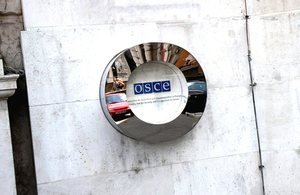UK Statement to the OSCE Permanent Council on the situation in Ukraine
Ambassador Dominic Schroeder's statement to the OSCE PC on the situation in Ukraine

OSCE sign at the organisation's headquarters in Vienna, Austria
Organisation for Security and Co-operation in Europe, Vienna, Austria
14 April 2014
Mr Chairman,
I fully support the statement made on behalf of the European Union and its Member States. I would like to add some remarks in a national capacity. The United Kingdom is gravely concerned by the violent events in Eastern Ukraine.
The past 48 hours have seen professional, well-armed, well-equipped, units wearing identical uniforms conduct coordinated military operations against Ukrainian State Institutions, seizing control of government buildings and erecting checkpoints and barricades in six cities.
This weekend’s events follow a now familiar pattern and constitute an obvious escalation of an already dangerous and fragile situation.
As a member of the United Nations, a Permanent Member of the Security Council and a participating State of the OSCE, Russia is obliged to refrain from the threat or use of force against the territorial integrity and political independence of any State. However, Russia is once again interfering directly in the internal affairs of Ukraine, contrary to international law, and in clear breach of OSCE principles and commitments. These actions have already been condemned by many around this table and the wider international community, including in the UN General Assembly.
Despite this condemnation, Russia has attempted to undermine the process of reconciliation in Ukraine. Russian media continue to spread disinformation and propaganda to stir up ungrounded fears and tensions. In spite of Russian claims to the contrary, the recent demonstrations in Eastern cities are not organic. They do not enjoy widespread support and the numbers of genuine pro-Russian protestors on the streets pale in comparison to the crowds of hundreds of thousands who protested against the former regime. Russia is conducting a well-orchestrated campaign to destabilise Ukraine.
At the same time, even publicly available satellite images continue to show up to 40,000 Russian troops, combat aircraft, tanks, artillery and logistical support units close to the border with Ukraine. Russian denials and excuses for this threatening presence do not hold water. If as Mr Lavrov says “Moscow is not interested in destabilising Ukraine” Then it should immediately redeploy its troops away from the border; cease all activity designed to heighten tensions; and revoke the mandate given by the Federation Council on 1 March to use military force on Ukrainian soil.
If Russia really has genuine concerns about Ukraine’s Russian speaking population then its actions have done nothing to safeguard their interests. The Ukrainian government has stated clearly that its programme of constitutional reform will include discussions on the degree of autonomy devolved to Ukraine’s regions. This is a clear pathway to resolve differences through peaceful, constitutional means. Russia must therefore engage in dialogue with Ukraine, starting with the Contact Group talks scheduled for this coming week. Looking further ahead, on 25 May the Ukrainian people will elect a new President. They have the right to do so, and to determine their own future, free from Russian interference.
We applaud the efforts of the OSCE Special Monitoring Mission to deploy to the areas of tension, to observe the situation and report on developments. We welcome their continued early and regular public reporting. The Special Monitoring Mission should carry out work across the full spectrum of its mandate, including the facilitation of dialogue on the ground in order to reduce tensions. It is crucial in the current climate that all sides receive objective and reliable reporting of facts on the ground and the monitoring mission does and should deliver this. Their presence is designed to safeguard the rights of all citizens of Ukraine and we look forward to their assessment of the situation and fully support their work.
Thank you